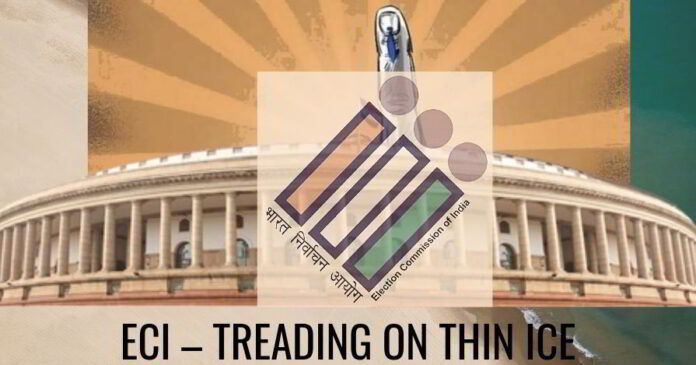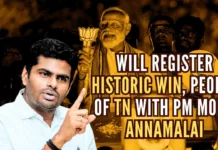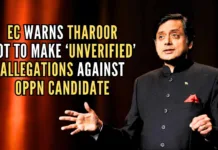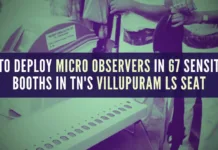
The ECI cannot place restrictions upon the enjoyment of statutory rights or constitutional rights by invoking Article 324, which is a source of merely executive authority.
The curtain has come down on the world’s biggest democratic exercise. Every single exit poll suggests that the BJP is likely to register a thumping victory and come back to power. The opposition is visibly shaken, and, with nowhere to turn to, has traded its guns at the Election Commission of India (ECI). The ECI did not do enough, says the opposition, pointing the finger at the clean chits given to Shri Narendra Modi by the poll body, holding that the Prime Minister committed no violation of the Model Code of Conduct. The ECI capitulated before the Prime Minister, claims Shri Rahul Gandhi.
I, on the other hand, am inclined to believe that if anything, the 2019 elections saw the ECI overreach its authority on multiple occasions. It is a dangerous trend for politicians, upon having failed to win the democratic battle in the public mind, to clamour for the ECI to go down the road which ought not to have been taken in the first place.
As per Article 19 (2) of the Constitution, fundamental rights conferred by Article 19 (1) Constitution are amenable only to reasonable restrictions imposed by legislative means.
The final phase of the election saw the ECI, in an extraordinary exercise of its purported authority under Article 324 of the Constitution, place a total embargo on political campaign in West Bengal from 16th May, 2019, till the conclusion of polls on 19th May, 2019. The move, which created a political furore, was not an isolated one. On 15th April, 2019, in a first, the ECI, invoking powers ostensibly conferred by Article 324, had banned the Uttar Pradesh Chief Minister Shri Yogi Adityanath and the Bahujan Samajwadi Party Chief Ms. Mayavati from holding public meetings, public processions, public rallies, road shows and interviews, public utterances in media, amongst other things, for 72 hours and 48 hours respectively, for having ‘appealed to caste and communal feelings’ or for having indulged in ‘activities which are ‘corrupt practices’ and offences under the election law, such as bribing of voters, intimidation of voters, etc.’
The 2019 Elections also saw the ECI nix release of films. On 10th April, 2019, just five days before banning Shri Yogi Adityanath and Ms. Mayavati, the ECI, in another extraordinary move under its purported authority under Article 324, had ordered the producers of the film ‘PM Narendra Modi’ to not exhibit the film until further orders, despite the fact that the film had been cleared for public exhibition by the Central Board of Film Certification or the Censor Board.
Did the ECI, under Article 324, had the authority to take recourse to the above-noted measures?
To my mind, the ECI clearly overstepped the bounds of its authority.
The scope of powers of the ECI under Article 324, which vests the superintendence, direction and control of elections in the ECI, was expounded by the Hon’ble Supreme Court in the case of A. C. Jose v Sivam Pillai and others, reported in 1984 SCC (2) 656, placing reliance upon the judgment rendered by a Constitution Bench in the famous case of N. P. Ponnuswami v Returning Officer, Namakkal Constituency and others, reported in AIR 1952 SC 64.
The Hon’ble Supreme Court, in the aforementioned case, held that ‘the power under Article 324 relating to superintendence, direction and control was actually vesting of merely all the executive powers and not the legislative powers’. In other words, the ECI, under Article 324, exercises only executive authority.
Given the well settled, and rather elementary, principle of law that statutory rights (rights granted by a legislation) or constitutional rights (rights conferred by the Constitution) cannot be curtailed by exercise of executive powers, the inescapable implication of the above noted observation of the Hon’ble Supreme Court is that the ECI cannot place restrictions upon enjoyment of statutory rights or constitutional rights by invoking Article 324, which is a source of merely executive authority.
The Hon’ble Apex Court, in the case of A. C. Jose (supra), also observed that ‘where there is an Act and express Rules made thereunder it is not open to the Commission to override the Act or the Rules and pass orders in direct disobedience to the mandate contained in the Act or the Rules’. In other words, it was held that if a particular field is occupied by a legislative enactment and rules made thereunder, the ECI has no option but to abide by the terms of such legislation. In such a situation there would be no occasion for the ECI to exercise powers under Article 324 of the Constitution.
It is on the touchstone of the law laid down in the case of A. C. Jose (supra) that the power of the ECI to bar politicians from holding public meetings, public processions, etc., and to prohibit or defer public exhibition of a film, duly sanctioned for release by the Censor Board, must be tested.
A bar, temporary or otherwise, on political campaigning for having ‘appealed to caste and communal feelings’ or for having indulged in ‘activities which are ‘corrupt practices’ and offences under the election law, such as bribing of voters, intimidation of voters, etc.’, self-evidently, amounts to placing a restriction upon one’s fundamental right to freedom of speech and expression, to assemble peacefully and without arms and to move freely throughout the territory of India, guaranteed by Articles 19 (1) (a), 19 (1) (b) and 19 (1) (d) respectively of the Constitution. As noted earlier, a constitutional right cannot be eclipsed by executive authority. In fact, as per Article 19 (2) of the Constitution, fundamental rights conferred by Article 19 (1) Constitution are amenable only to reasonable restrictions imposed by legislative means. Thus, the ECI had no jurisdiction to bar politicians from campaign-related activities in the exercise of its executive powers under Article 324.
One may find the new-found activism of ECI appealing at first blush. But activism cannot supplant the rule of law. Acts done without jurisdiction cannot be sanctified, no matter how well-intentioned.
Moreover, the Representation of People Act, 1951, contains elaborate provisions to deal with electoral offences or corrupt practices such as ‘appeal to caste and communal feelings’ or for having indulged in ‘activities which are ‘corrupt practices’ and offences under the election law, such as bribing of voters, intimidation of voters, etc.’ Chapter I of Part VII of the Act, 1951, deals with corrupt practices whereas Chapter III of Part VII of the Act, 1951, deals with electoral offences. Section 171 A to I of the Indian Penal Code also deals with electoral offences. If a candidate or his election agent or any other person, with the consent of the candidate, indulge in any corrupt practice, his or her election may be called in question by means of an election petition instituted before the High Court in terms of Section 100 (1) (b) of the Act, 1951. If the charge pertains to the commission of an electoral offence, the criminal justice system may be set in motion and the regular courts shall determine the culpability of the person concerned and impose appropriate punishment if found guilty.
It is, therefore, clear that there are detailed statutory provisions dealing with corrupt practices and electoral offences. As such, keeping in mind the law laid down by the Hon’ble Supreme Court in the case of A. C. Jose (supra) that if a particular field is occupied by legislation the ECI must adhere to it, it is safe to say that it was not open to the ECI to hold politicians guilty of corrupt practices or electoral offences and dish out punishment by taking recourse to its executive powers under Article 324.
Ordering the producers of the film ‘PM Narendra Modi’ to not exhibit the film until further orders, despite the Censor Board having cleared the decks for the film’s release, was also a legally and constitutionally unwarranted act on the part of the ECI.
Once the film in question was sanctioned by the Censor Board, under Section 4 (1) of the Cinematograph Act, 1952, for unrestricted public exhibition, a statutory right arose in the favour of the producers of the film to have the film released to the public. As noted earlier, executive authority cannot eclipse a statutory right. It was, therefore, not within the powers of the ECI to nix the release of the film in the exercise of its executive authority under Article 324.
At this juncture, it may be noted the Hon’ble Supreme Court, in the case of Secretary, Ministry of Information and Broadcasting v M/s Gemini TV, reported in (2004) 5 SCC 714, issued certain directives to the ECI for regulation of political advertisements during the operation of the model code of conduct. But as the ECI itself opined that it was difficult to conclude that the film constituted a political advertisement, the aforesaid case is not germane to the matter at hand.
Lastly, as noted earlier, if a field is governed by legislative enactment, the ECI has no option but to defer to the scheme of such legislation. The Cinematograph Act, 1952, is a complete code in so far as certification of films for exhibition and for regulating exhibition by means of cinematography is concerned. There was, therefore, no occasion for the ECI to step in by resorting to powers under Article 324. By doing so, the ECI clearly exercised an authority not vested in it.
The ECI had reasoned that the film was in the nature of biography or hagiography and had the potential to disturb the electoral level playing field. Even so, arguing without conceding, the fact remains that the ECI, under Article 324 exercises only executive powers which could not have prevailed over the statutory rights of the producers of the film.
One may find the new-found activism of ECI appealing at first blush. But activism cannot supplant the rule of law. Acts done without jurisdiction cannot be sanctified, no matter how well-intentioned. The constitution represents a very delicate balance between institutions. It is, first and foremost, the responsibility of the institutions to maintain the balance lest the constitutional order begins to crumble. When institutions overreach in a bid to do good, it begets adhocism. Adhocism, to my mind, is a direct antithesis of the rule of law and ought to be guarded against lest it erodes the very foundations of our body politic.
Note:
1. Text in Blue points to additional data on the topic.
2. The views expressed here are those of the author and do not necessarily represent or reflect the views of PGurus.
- Election Commission of India – Treading on thin Ice - May 22, 2019
- Rahul Gandhi’s Citizenship – The Centre Must Decide - April 23, 2019
- Bombay High Court- Convert may inherit self-acquired property of Hindu father - March 30, 2018











Rules were made to invoke / apply by the executives,
Absence of parliament how can you make rule.
This is not the right time to make new statute for application.
The actions by EC shows complete lack of administrative skill sets.
On one hand, it comes heavily on Yogi Adityanath, Mayawati and likes. On the other hand, it looked the other way when the report of denial of voting and boot rigging came from WB. Ok, the EC in-charge, Aarij Aftab may have give clean chit of “Very peaceful voting” in all cases for some extraneous considerations. But political parties did complain and videos and media reports were available.
Yes, they didn’t take action on Modi-ji out of unwritten convention. They also didn’t take action on Mamata who wanted “inch by inch badla”.
It seems that EC group was really scared of politicians and din’t want to take any action. Whenthey were forced, they took extreme actions on people who would not take revenge.